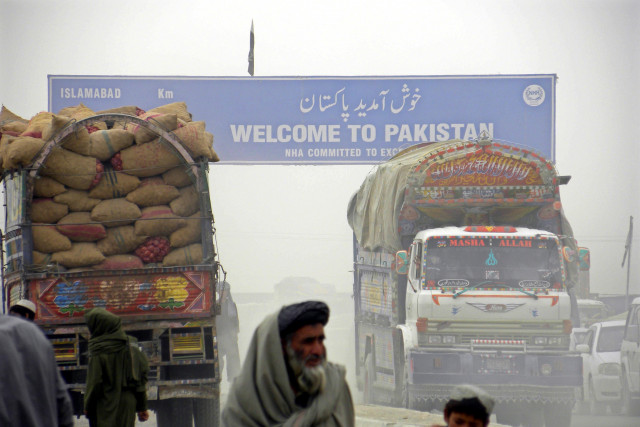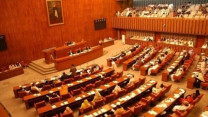Pakistan-Afghanistan border crossing opens 24 hours
Move likely to give boost to struggling trade between two neighbours

Move likely to give boost to struggling trade between two neighbors
Torkham -- one of the 18 border crossings between the two countries that connects Pakistan’s northwestern Khyber district with northeastern Nangarhar province of Afghanistan -- now stays open 24 hours for cross-border movement for the first time in the recent history, Mahmood Wazir, Khyber district’s deputy commissioner, told Anadolu Agency.
The development came days after the US President Donald Trump suspended peace talks with the Afghan Taliban last week.
Previously, Torkham crossing remained operational for 12 hours only, which would cause night-long wait for the truckers on either sides of the frontier. Apart from truckers, patients from bordering Afghan provinces too had to suffer in case of an emergency due to border closure during the night.
The border has been operational round the clock for the last five days on probationary basis, the official said, adding that over 1,600 additional trucks have crossed into the border from both sides only at night during this period.
Prime Minister Imran Khan together with senior Afghan officials, including governor of Nangarhar province, is expected to officially inaugurate the 24/7 service on September 18 at Torkham border, Wazir said.
The premier, according to him, would also break the ground of a 16 billion rupees ($120 million) project for the extension of the Integrated Transit Trade Management System aimed at further improving the one-window facilitation transit trade system.
The project is scheduled to complete in 2022.
In addition, Pakistan has also established a state-of-the -art Pakistan-Afghanistan Friendship Hospital at Torkham border to provide medical facilities to the patients from Afghanistan.
Declining trade
The two sides have agreed to open "several" other crossings -- including southwestern Chaman border -- round the clock in near future, according to a local broadcaster.
Escalating diplomatic tensions and frequent border closures have had a chilling effect on Pakistan-Afghanistan trade in recent years.
The latest move coincides with a nearly 50% reported decrease -- from $2.7 billion to $1.4 billion -- in bilateral trade between the two countries in the last two years.
The trade volume hit a record $2.7 billion in 2015 and it could have touched $5 billion easily if the trade had not been mixed up with politics, according to analysts.
Trade between the neighbours is conducted under the Afghanistan-Pakistan Transit Trade Agreement, a bilateral deal signed in 2010.
The current trade volume, according to the two chambers of commerce, is hugely weighted towards Pakistan, which is said to have an 80% share.



















COMMENTS
Comments are moderated and generally will be posted if they are on-topic and not abusive.
For more information, please see our Comments FAQ